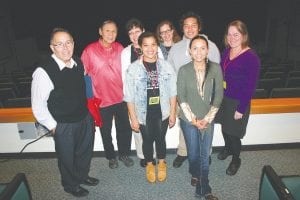Students in grades 2-12 from Oshki Ogimaag, Great Expectations, and ISD 166 participated in a cultural awareness workshop on October 8. The program was presented by Project s.t.a.r.t (Students Together Allied for Racial Trust) of South High School in Minneapolis. (L-R) Dr. Thomas Peacock, Grand Portage Tribal Councilor John Morrin, Project s.t.a.r.t. consultant Kate Towle, South High student Amirah Ellison, South High teacher Laura Yost Manthey, South High student Frankie Reyes, Grand Portage Education Director Haley Brickner, and South High parent Lyn Mitchell.

Four years ago, students at South High School in Minneapolis began to notice rapid shifts in the demographic makeup of the school. With the help of adult consultant Kate Towle, they began meeting weekly to talk about racial and cultural issues that affected all of them. From this, they developed a cultural awareness program and started writing curriculum and speaking publicly.
They called their work Project s.t.a.r.t. – Students Together Allied for Racial Trust. “It’s their work,” Towle said. “I think that is what makes it more engaging for students.” On October 8, 2013, they introduced their work to Cook County students.
Students in grades 2-12 from Oshki Ogimaag, Great Expectations, and ISD 166 took part in the workshop. Middle and high school students heard presentations from South High students Amirah Ellison and Frankie Reyes and author, historian, and UMD professor Dr. Thomas Peacock. All the students were involved in small group sessions where they were invited to think about their own identities and cultural history and talk about how stories change, reflecting individual perspectives, as they are passed from person to person.
Consultant Kate Towle has seen racial tensions decrease when students exchange personal stories. She stated in a training session for facilitators the evening before the workshop that people remember and pass on parts of their histories things that are meaningful to them, and when they share their stories, they gain bits and pieces they didn’t have before and are enriched in the process. “I just have not seen a better path to cultural understanding than narrative,” Towle said.
Cook County faculty and educational leaders from Grand Portage helped facilitate the small groups. The two students from South High who led some of the groups reported positive and engaged responses from the students. “It got to their hearts,” said Frankie Reyes. “It opened up a new door.”
After the workshop, the facilitators talked about some obstacles they had observed. Some of the adult leaders sensed reluctance among the students to be open with the adults. Although Principal Adam Nelson said that he received a lot of positive feedback from staff, one facilitator said not all staff members seemed open to addressing the issues. One facilitator said it seemed that the dominant mentality is that racism doesn’t exist here, although many students even at the elementary level reported having heard racial slurs.
Kate Towle said that students do not bridge cultural gaps in school without the help of adults. Some schools have student bodies that are ready to talk about culture and race but have administrations that are not, she said. One facilitator said some kids suspect that “respect” is used as a tool to maintain order and is not earned by those demanding it. “I think teacher education is really huge,” said another facilitator.
Student facilitator Amirah Ellison complimented social studies teacher David Lichty on doing an exceptional job dealing with cultural issues that day. One of the adult facilitators complimented second grade teacher K.B. O’Neill on preparing her students for the workshop so that they would understand the purpose behind it. Another facilitator said science teacher Al Heine shared some things with his group that were really helpful for the students.
Dealing with cultural issues in the school involves changing an institution that has been operating the same way for generations, said Grand Portage Tribal Council Member John Morrin. They have allies in the community, he said, but they need to be organized because they will have opposition. “This has really been a good, positive start for this school and for this whole community,” he said.
The hope of the workshop’s organizers is that the workshop would spark an interest among local students to form a student leadership team to promote cultural awareness and understanding. Other possible initiatives that could pick up where the workshop left off include having teachers read and discuss books on culture in their professional development groups, using literature to foster dialogue about cultural issues, incorporating textbooks on cultural awareness into the curriculum, such as Dr. Thomas Peacock’s latest book, To Be Free, community members reading and discussing a book together, and continuing to introduce students to Anishinaabe language and cultural traditions.


Loading Comments